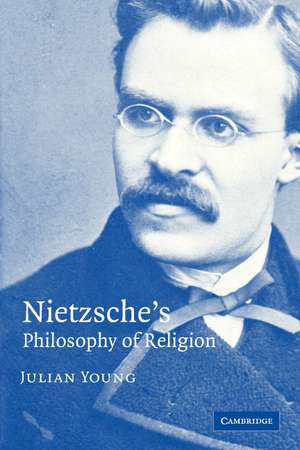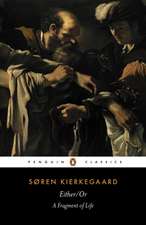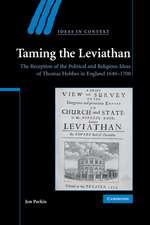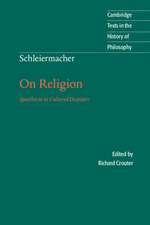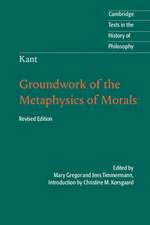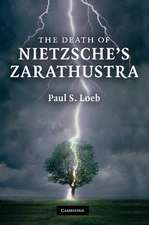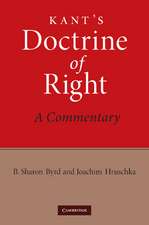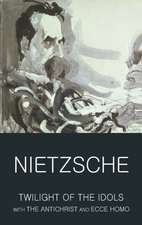Nietzsche's Philosophy of Religion
Autor Julian Youngen Limba Engleză Paperback – 5 apr 2006
| Toate formatele și edițiile | Preț | Express |
|---|---|---|
| Paperback (1) | 329.45 lei 43-57 zile | |
| Cambridge University Press – 5 apr 2006 | 329.45 lei 43-57 zile | |
| Hardback (1) | 437.40 lei 43-57 zile | |
| Cambridge University Press – 5 apr 2006 | 437.40 lei 43-57 zile |
Preț: 329.45 lei
Nou
Puncte Express: 494
Preț estimativ în valută:
63.06€ • 68.52$ • 53.00£
63.06€ • 68.52$ • 53.00£
Carte tipărită la comandă
Livrare economică 21 aprilie-05 mai
Preluare comenzi: 021 569.72.76
Specificații
ISBN-13: 9780521681049
ISBN-10: 0521681049
Pagini: 244
Dimensiuni: 152 x 229 x 13 mm
Greutate: 0.4 kg
Editura: Cambridge University Press
Colecția Cambridge University Press
Locul publicării:Cambridge, United Kingdom
ISBN-10: 0521681049
Pagini: 244
Dimensiuni: 152 x 229 x 13 mm
Greutate: 0.4 kg
Editura: Cambridge University Press
Colecția Cambridge University Press
Locul publicării:Cambridge, United Kingdom
Cuprins
Introduction; 1. Schopenhauer: on man's need for metaphysics; 2. The birth of tragedy; 3. Untimely meditations; 4. Human, all too human; 5. The gay science; 6. Zarathustra; 7. Beyond good and evil; 8. The genealogy of morals; 9. The Wagner case; 10. Twilight of the idols; 11. The antichrist; 12. Ecce homo; Epilogue: Nietzsche in history.
Recenzii
'Julian Young offers a comprehensive, profound, yet consistently lively and engaging overview of Nietzsche's almost obsessive reflections on religion. Young's claim is that instead of rejecting all religion, Nietzsche tries to revive a richer, 'healthier' religious life that existed in earlier times, one that gives us a meaningful way of understanding community, commitment, devotion, the fact of death, and even the 'gods'.' Charles Guignon, University of South Florida
'Every student of Nietzsche in the Anglophone world should read this book.' Nietzsche Circle
'In Nietzsche's Philosophy of Religion, Young presents a scandalously unscandalous version of the author who dreamed of dividing world history in two. politically, Young's Nietzsche was neither a proto-anarchist nor a proto-Nazi, but a mainstream one-nation conservative who, though not much of a democrat, would have favoured something like 'twentieth-century Scandinavian social democracy.' New Humanist
'Every student of Nietzsche in the Anglophone world should read this book.' Nietzsche Circle
'In Nietzsche's Philosophy of Religion, Young presents a scandalously unscandalous version of the author who dreamed of dividing world history in two. politically, Young's Nietzsche was neither a proto-anarchist nor a proto-Nazi, but a mainstream one-nation conservative who, though not much of a democrat, would have favoured something like 'twentieth-century Scandinavian social democracy.' New Humanist
Notă biografică
Descriere
In this book, Julian Young argues that Nietzsche's early religious communitarianism persists through all his published works.
